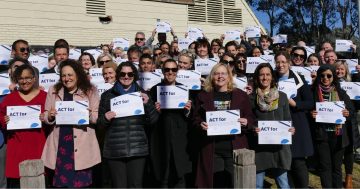
Raising the rate of Newstart will not spell the end of poverty in the ACT- but it can certainly help.
Could you live on $39 a day?
I am not talking about for a short period of time, but week upon week, month upon month? Not just to pay for rent, food and transport, but also to pay for doctor’s bills, medications, shoes and clothes, and a haircut once in a while.
The unemployment benefit Newstart has been designed as a safety net for people who are out of the workforce for a short period of time. The economic reality means, however, that often unemployment lasts longer than a few weeks. A lack of jobs means that no matter how motivated or skilled you are, you may be unlucky enough to be out of work for an extended period of time. Sometimes life events such as an illness or injury, new technology or changes in workplaces mean you may be out of work. While few people want to be on these payments long term, the statistics suggest that just under half of Newstart recipients are on the payment for more than two years.
I regularly engage with people in financial stress and know that no matter how good you are at budgeting or how frugal you are, you can’t live on this poverty payment. It’s made all the more difficult in a community like Canberra. We live in a community with high rents, high costs of living and a climate that drives high utility. This means that people on very low incomes are forced to make impossible choices such as having to choose between paying rent or feeding their family. Many of these people rely on Newstart as a key source of income. A key reason this creates so much stress is the current Newstart allowance that is still sitting at the same rate in real terms as it was in 1994.
There is no doubt that we should raise the rate of Newstart, and other working-age social security payments that have not kept up with the costs of living (including Youth and Sickness Allowances) because it is the right thing to do. The community recognises this and is supportive of the calls to raise the rate. This was highlighted in a recent Essential poll that found that more than two-thirds of Australians believe that the Newstart rate should be raised.
There are other compelling reasons for raising the rate of Newstart. For a number of years, the calls to raise Newstart and other key payments have been backed by business – including the Business Council of Australia and the Australian Industry Group. A recent analysis conducted by Deloitte Economics gives us an indication of why these businesses support the initiative. As outlined in this report, business has recognised that raising the rate of Newstart is not only good for individuals and households – it is also good for the economy via retail spending, jobs growth and revenue to the government.
Internationally, there is a growing awareness of the negative effect of inequality on economies. Nations with greater levels of inequality tend to have lower economic growth over time, and shorter spells of high economic growth. Inadequate income support payments do drive inequality and create a divide between the haves and have-nots.
The recent Deloitte report quantified the economic benefits of raising the rate on our local community. As highlighted by the ACT Council of Service Service last week, the report details how raising the rate of this payment would result in an increase in total disposable income of $30.51 million. Because this income goes to people on the very lowest incomes we know that this goes straight back into the economy – to purchase essential goods and services including food, housing, heating and transport. As such, consumption would increase by $42.81 million and economic output would increase by $18.67 million. ACTCOSS calls it a ‘social and prosperity dividend for Canberra’, with everyone benefiting from an increase in the payment.
Raising Newstart is a Federal Government decision, and it was good to see the Chief Minister be the first state or territory leader to back this call in his budget speech this year. While it’s not in the ACT Government’s power to raise the rate of Newstart, there are things we can do here in Canberra to make life a bit more manageable for people living on very low incomes. There are some good concessions programs that make it a little easier, such as energy bill concessions. But there are also barriers, such as the surcharge put on people who only purchase three or six months of car registration. The ACT Government has made millions on this charge, even though it was identified in 2012 as something that was unfairly targeting low-income households. This is a small change that could be made to ease the pressure on low-income families in Canberra.
I think we need to do all we can to reduce the level of inequality in Canberra. What do you think we should do to make Canberra a more equal community?




















